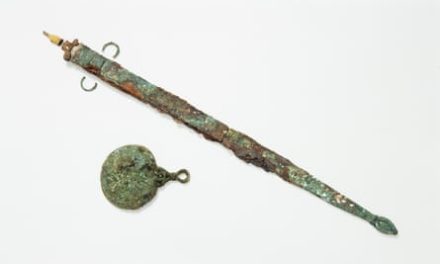The Barbican has apologised after asking a Palestinian speaker to avoid discussing “free Palestine” at length during an event, calling the intervention “unacceptable and a serious error of judgment”.
Last week Elias Anastas, a co-founder of the Palestine-based Radio Alhara, was invited to deliver a livestreamed talk remotely on the radical possibilities of radio, exploring how broadcasting could be used as a tool of subversion.
But during the soundcheck for the event, Anastas said he received a text message from someone who works at the Barbican saying: “In terms of content, avoid talking about free Palestine at length …just to further safeguard the audience.”
Moments earlier, a member of the Barbican’s management reportedly pulled aside Anastas’ interviewer, Nihal El Aasar, and asked if she and Anastas could “steer clear of thorny issues” such as “free Palestine … or whatever”. The event was then cancelled due to technical difficulties, understood to be poor wifi.
Artists for Palestine UK, a network of pro-Palestinian artists and culture workers, said the intervention “raises urgent questions about the organisation’s commitment to freedom of expression and anti-discrimination”.
In a statement on Wednesday, the Barbican said it “always strives to use our platform and programme to represent the widest possible range of worldviews, human experiences, artistic expressions, and enable free exchange of ideas and debate.”
It said: “In haste, shortly before the event was due to begin, the Barbican shared an editorial note with the speaker asking him to avoid spending too much time discussing ‘free Palestine’. The situation was compounded by a technical failure with the live broadcast, which unfortunately brought the event to an abrupt close.
“The intervention by the Barbican relating to the content of the talk was unacceptable and a serious error of judgment, for which we are deeply sorry. As an organisation we believe in the importance of free speech, dialogue and debate – giving a platform to the experiences and views of individuals and groups involved in ‘free Palestine’ is part of this commitment.”
The event was part of a three-day programme in the Barbican’s Curve Gallery co-organised by the Resolve collective, an interdisciplinary design group that addresses social issues. In response to the incident, the collective said it was ceasing all its public programme events at the Barbican as well as pulling its exhibition, which was originally scheduled to run until 16 July.
In a statement, the artists alleged that during the course of their time as Curve Gallery artists they had “experienced a number of shameful incidents” at the venue.
Claire Spencer, the chief executive of the Barbican, and Will Gompertz, its artistic director, said: “During the run of their exhibition, Resolve Collective and their collaborators have been subject to a number of unacceptable experiences, which included the events that took place on Thursday 15 June.
“We are deeply sorry for the pain caused to the members of Resolve Collective and those involved in their exhibition. Nobody should have to work in a place where they don’t feel welcome and respected. Will and I are taking this situation extremely seriously and are currently working with the broader Barbican team to understand the details of what happened.”
They continued: “We are fully supportive of Resolve Collective’s decision to change the nature of their exhibition and will work with them to make this possible. The exhibition will reopen on Monday 26 June until 16 July.
“A great deal of work has already gone into building a new culture at the Barbican in which all our people, and those who we work with, are valued, supported, and feel they belong. It’s clear we have a lot more work to do but we are committed to making the Barbican a place that is inclusive, welcoming, and safe for everyone.”
In February, more than 50 artists, including the poet Benjamin Zephaniah and the Turner prize co-winner Tai Shani, protested over the Barbican’s collaboration with the Israeli embassy in London in putting on a concert.
In 2021, the Barbican committed to “a radical transformation of culture and behaviours” after more than 120 allegations – a third of which related to racism – were investigated by lawyers as part of an external review of its operation.
Join the exciting world of cryptocurrency trading with ByBit! As a new trader, you can benefit from a $10 bonus and up to $1,000 in rewards when you register using our referral link. With ByBit’s user-friendly platform and advanced trading tools, you can take advantage of cryptocurrency volatility and potentially make significant profits. Don’t miss this opportunity – sign up now and start trading!







Recent Comments